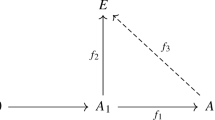Abstract
The main objective of this paper is to compute RO(G)-graded cohomology of G-orbits for the group \(G=C_n\), where n is a product of distinct primes. We compute these groups for the constant Mackey functor \(\underline{\mathbb {Z}}\) and the Burnside ring Mackey functor \(\underline{A}\). Among other results, we show that the groups \(\underline{H}^\alpha _G(S^0)\) are mostly determined by the fixed point dimensions of the virtual representations \(\alpha \), except in the case of \(\underline{A}\) coefficients when the fixed point dimensions of \(\alpha \) have many zeros. In the case of \(\underline{\mathbb {Z}}\) coefficients, the ring structure on the cohomology is also described. The calculations are then used to prove freeness results for certain G-complexes.
Similar content being viewed by others
Data availability
Data sharing is not applicable to this article as no datasets were generated or analyzed during the current study.
References
Anderson, D.W.: Universal Coefficient Theorems for \(K\)-Theory, Mimeographed Notes (1969). http://faculty.tcu.edu/gfriedman/notes/Anderson-UCT.pdf
Basu, S., Ghosh, S.: Computations in \(C_{pq}\)-Bredon cohomology. Math. Z. 293, 1443–1487 (2019)
Bredon, G.E.: Equivariant cohomology theories. In: Lecture Notes in Mathematics, No. 34, Springer, Berlin, New York (1967)
Dress, A.W.M.: Contributions to the theory of induced representations, in Algebraic \(K\)-theory, II. In: “Classical” Algebraic \(K\)-Theory and Connections with Arithmetic (Proceedings of the Conference Held at the Seattle Research Center of Battelle Memorial Institute, 1972 ), Lecture Notes in Math., vol. 342, pp. 183–240 (1973)
Ferland, K.K.: On the RO(G)-graded equivariant ordinary cohomology of generalized G-cell complexes for G = Z/p. ProQuest LLC, Ann Arbor, MI, Thesis (Ph.D.)–Syracuse University (1999)
Ferland, K.K., Lewis, L.G., Jr.: The \(R{\rm O}(G)\)-graded equivariant ordinary homology of \(G\)-cell complexes with even-dimensional cells for \(G={\mathbb{Z} }/p\). Mem. Amer. Math. Soc. 167, viii+129 (2004)
Greenlees, J.P.C., May, J.P.: Equivariant stable homotopy theory. In: Handbook of Algebraic Topology, pp. 277–323. North-Holland, Amsterdam (1995)
Hill, M.A., Hopkins, M.J., Ravenel, D.C.: On the nonexistence of elements of Kervaire invariant one. Ann. Math. (2) 184, 1–262 (2016)
Hill, M.A., Hopkins, M.J., Ravenel, D.C.: The slice spectral sequence for certain \(RO(C_{p^n})\)-graded suspensions of \(H { Z}\). Bol. Soc. Mat. Mex. (3) 23, 289–317 (2017)
Hill, M.A., Meier, L.: The \(C_2\)-spectrum \({\rm Tmf}_1(3)\) and its invertible modules. Algebra Geom. Topol. 17, 1953–2011 (2017)
Lewis, L.G. Jr., The \(R{\rm O}(G)\)-graded equivariant ordinary cohomology of complex projective spaces with linear \({ Z}, p\) actions. In: Algebraic Topology and Transformation Groups (Göttingen, vol. 1361 of Lecture Notes in Math. 1988, pp. 53–122 . Springer, Berlin (1987)
Lewis, L.G., Jr.: The equivariant Hurewicz map. Trans. Am. Math. Soc. 329, 433–472 (1992)
Lewis, L.G.Jr., May, J.P., Steinberger, M., McClure, J.E.: Equivariant stable homotopy theory, vol. 1213 of Lecture Notes in Mathematics, Springer, Berlin. With contributions by J. E. McClure (1986)
Mandell, M.A., May, J.P.: Equivariant orthogonal spectra and \(S\)-modules. Mem. Am. Math. Soc. 159, x+108 (2002)
May, J.P.: Equivariant Homotopy and Cohomology Theory, vol. 91 of CBMS Regional Conference Series in Mathematics, Published for the Conference Board of the Mathematical Sciences, Washington, DC; by the American Mathematical Society, Providence, RI. With contributions by M. Cole, G. Comezaña, S. Costenoble, A. D. Elmendorf, J. P. C. Greenlees, L. G. Lewis, Jr., R. J. Piacenza, G. Triantafillou, and S. Waner (1996)
Ricka, N.: Equivariant Anderson duality and Mackey functor duality. Glasg. Math. J. 58, 649–676 (2016)
Thévenaz, J., Webb, P.: The structure of Mackey functors. Trans. Am. Math. Soc. 347, 1865–1961 (1995)
Thévenaz, J., Webb, P.J.: Simple Mackey functors. In: Proceedings of the Second International Group Theory Conference (Bressanone, 1989), no. 23, pp. 299–319 (1990)
Acknowledgements
The research of the first author was supported by the SERB MATRICS Grant 2018/000845. The authors would like to thank the anonymous referee for her or his detailed comments which has improved the exposition in the paper.
Author information
Authors and Affiliations
Corresponding author
Additional information
Publisher's Note
Springer Nature remains neutral with regard to jurisdictional claims in published maps and institutional affiliations.
Rights and permissions
Springer Nature or its licensor (e.g. a society or other partner) holds exclusive rights to this article under a publishing agreement with the author(s) or other rightsholder(s); author self-archiving of the accepted manuscript version of this article is solely governed by the terms of such publishing agreement and applicable law.
About this article
Cite this article
Basu, S., Ghosh, S. Equivariant cohomology for cyclic groups of square-free order. Res Math Sci 11, 29 (2024). https://doi.org/10.1007/s40687-024-00443-0
Received:
Accepted:
Published:
DOI: https://doi.org/10.1007/s40687-024-00443-0



